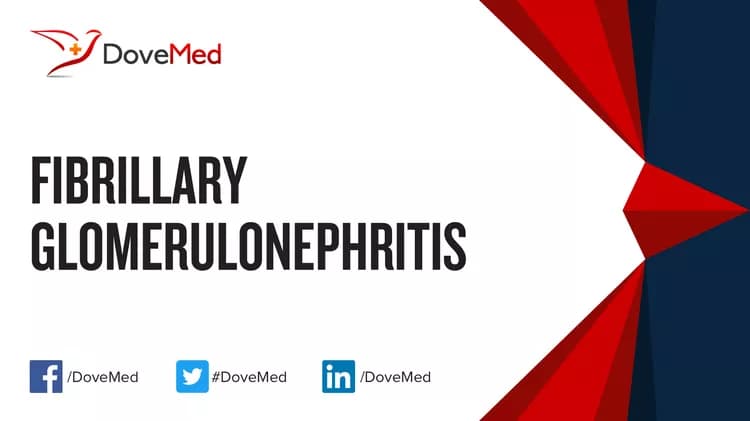What are the other Names for this Condition? (also known as/Synonyms)
- Congo Red-Negative Amyloidosis-Like Glomerulopathy
- Non-Amyloid Fibrillary Glomerulonephritis
- Non-Amyloid Fibrillary Glomerulopathy
What is Fibrillary Glomerulonephritis? (Definition/Background Information)
- Fibrillary Glomerulonephritis is an uncommon cause of glomerular disease, which probably results from deposits derived from immunoglobulins but in most cases the cause is idiopathic (unknown)
- The signs and symptoms include blood (hematuria) and protein (proteinuria) in the urine, kidney insufficiency and high blood pressure
- The diagnosis is made with a kidney biopsy and by electron microscopy
- Fibrillary Glomerulonephritis has been associated with hepatitis C virus infection and with malignancy and autoimmune disease. Because of this, patients should be screened for these conditions
- Treatment is generally determined by the severity of the kidney problems
(Source: Fibrillary Glomerulonephritis; Genetic and Rare Disease Information Center (GARD) of National Center for Advancing Translational Science (NCATS), USA.)
Who gets Fibrillary Glomerulonephritis? (Age and Sex Distribution)
- Fibrillary Glomerulonephritis is a rare disorder, which may affect individuals between the ages of 10-89 years
- Both males and females may be affected
- Worldwide, individuals of all racial and ethnic groups may be affected; Caucasians bear a slightly increased risk of developing this kidney disorder
What are the Risk Factors for Fibrillary Glomerulonephritis? (Predisposing Factors)
The risk factors for Fibrillary Glomerulonephritis include the following:
- Certain autoimmune disorders (such as systemic lupus erythematosus)
- Infectious conditions such as hepatitis C viral infection
- Certain types of cancers
It is important to note that having a risk factor does not mean that one will get the condition. A risk factor increases one’s chances of getting a condition compared to an individual without the risk factors. Some risk factors are more important than others.
Also, not having a risk factor does not mean that an individual will not get the condition. It is always important to discuss the effect of risk factors with your healthcare provider.
What are the Causes of Fibrillary Glomerulonephritis? (Etiology)
- Fibrillary Glomerulonephritis is caused by abnormal protein aggregates that clog the filtration units of kidneys, known as the glomeruli
- These abnormal proteins may be secreted in response to chronic infections such as hepatitis C virus infection, autoimmune diseases and certain cancers
- However, in most cases, the cause of prolonged and sustained activation of the immune system may not be known
What are the Signs and Symptoms of Fibrillary Glomerulonephritis?
The signs and symptoms of Fibrillary Glomerulonephritis may include:
- Swollen legs and feet
- Blood in urine
- Protein loss in urine
- High blood pressure
- Anemia
- Loss of appetite
- Nausea
- Itching
- Shortness of breath
- Rapid rate of heartbeat
- Confusion
How is Fibrillary Glomerulonephritis Diagnosed?
Fibrillary Glomerulonephritis is diagnosed on the basis of the following information:
- Complete physical examination
- Thorough medical history evaluation
- Assessment of signs and symptoms
- Laboratory tests
- Biopsy and imaging studies
Fibrillary Glomerulonephritis can be differentiated from a similar condition known as immunotactoid glomerulopathy, by electron microscopy; the fibrils in fibrillary glomerulonephritis are smaller and randomly oriented as opposed to the larger and often organized fibrils of immunotactoid glomerulopathy.
(Source: Fibrillary Glomerulonephritis; Genetic and Rare Disease Information Center (GARD) of National Center for Advancing Translational Science (NCATS), USA.)
Many clinical conditions may have similar signs and symptoms. Your healthcare provider may perform additional tests to rule out other clinical conditions to arrive at a definitive diagnosis.
What are the possible Complications of Fibrillary Glomerulonephritis?
The complications of Fibrillary Glomerulonephritis may include:
- Chronic kidney disease progressing to end-stage kidney disease
- Recurrence of the condition following kidney transplantation, leading to graft failure
How is Fibrillary Glomerulonephritis Treated?
There is no effective treatment to cure Fibrillary Glomerulonephritis. The treatment is usually given to manage the signs and symptoms and any complication that develops, and may include the following:
- Steroid therapy
- Immune-suppressing medications
- Treatment of an underlying condition that is identified as the cause of Fibrillary Glomerulonephritis
- Plasmapheresis (blood filtration outside the body to remove clogging proteins)
- Dialysis
- Kidney transplantation
How can Fibrillary Glomerulonephritis be Prevented?
- Fibrillary Glomerulonephritis may not be preventable, if the cause is unknown
- In cases where an underlying cause is identified, treatment for the same may delay progression of the condition resulting in Fibrillary Glomerulonephritis
- Regular medical screening at periodic intervals with tests and physical examinations are recommended
What is the Prognosis of Fibrillary Glomerulonephritis? (Outcomes/Resolutions)
- Fibrillary Glomerulonephritis is a progressive disorder, and therefore, the prognosis is guarded
- Many affected individuals experience kidney failure which may require dialysis, thus severely affecting the quality of their life
- Typically, the prognosis may be assessed on a case-by-case basis
Additional and Relevant Useful Information for Fibrillary Glomerulonephritis:
The following DoveMed website link is a useful resource for additional information:
Related Articles
Test Your Knowledge
Asked by users
Related Centers
Related Specialties
Related Physicians
Related Procedures
Related Resources
Join DoveHubs
and connect with fellow professionals


0 Comments
Please log in to post a comment.